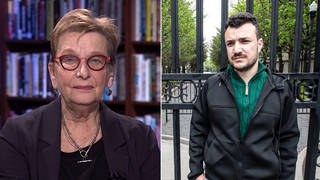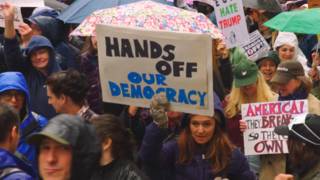
As the religious right puts gay marriage at the center of national politics, we look at a broader agenda for the progressive queer rights movement. As the government cuts back on social spending, the family unit has to pick up the slack and therefore marriage is enshrined as never before even as fewer households have access to its benefits. We speak with Richard Kim of the Nation Magazine. [includes rush transcript]
This past weekend tens of thousands of people took part in events and parades across the country. The annual pride parades commemorate the Stonewall uprising of 1969, when gay and transgendered bar patrons resisted a police raid in New York. It is widely considered the beginning of the gay rights movement.
While people celebrated in big cities like New York, San Francisco, Chicago, Seattle and Atlanta, other smaller cities also held pride events. 300 people marched in Conway, Arkansas in the city’s second annual pride parade and Muncie, Indiana held it’s first pride parade ever.
But this year’s pride commemorations comes as many conservatives have used the campaign to ban gay marriage as a way to galvanize it’s base. Ballot initiatives banning same-sex marriage easily passed in all of the eleven states in which they were introduced. And new anti-gay marriage amendments have been introduced in as many as fourteen states.
- Richard Kim, writer for the Nation magazine . His article about gay rights and same-sex marriage will appear in the forthcoming issue of the Nation.
Transcript
AMY GOODMAN: Joining us in the studio is Richard Kim. He is a writer for The Nation magazine. His article about gay rights and same-sex marriage will appear in the forthcoming issue of The Nation. Welcome to Democracy Now!
RICHARD KIM: Thank you, Amy. Thanks for having me here.
AMY GOODMAN: Your thoughts today in Gay Pride Month, Monday after the big Gay Pride celebrations around the country about the state of gay politics today.
RICHARD KIM: I mean, I think we have — there’s a lot of progress that’s happened in the past few years. We have to remember two years ago right before Gay Pride, the Supreme Court announced in Lawrence v. Texas — this was the Texas sodomy case — that for the first time gay sex was not criminal sex in many states. That was two years ago. The year after that, the Massachusetts Supreme Court ruled to legalize gay marriage there. So there’s been enormous and very swift progress, legally speaking, in the past two years.
In terms of the movement, I think the elections were a big blow. I don’t think movement leaders or the rank and file expected the 11 anti-gay marriage amendments to pass as easily as they did. We knew that they were going to pass in most states. We had hoped for Oregon actually going the other way. But the numbers were really shocking: 75%, 80% in states like Michigan, Ohio. This was a big blow. And what I think what’s happened since the election has been a real reconsideration of what the strategy is, grassroots organizing, and how to actually go about pursuing the various goals the movement has, which is not just marriage, but which is also employment non-discrimination, in housing non-discrimination. Some people want gays in the military, some in the movement are opposed to that, so there’s, I think, a real loosening and some windows opening now to rethink what the priorities of the movement are and what the strategies might be.
AMY GOODMAN: Can you describe that debate for a moment about gay men and lesbians in the military?
RICHARD KIM: Sure. I mean, well, it’s an interesting debate at this time because, of course, there’s a war going on, and on terms of equality and equality of inclusion into the institutions of the country, you can make a case for gays in the military. On the other hand, it doesn’t come with the critique of militarization. I keep thinking during — I think it was the Afghanistan War there was some soldiers that painted on a bomb a gay epithet, “die faggots” or something like that. And the immediate outcry from the gay mainstream movement was to turn that into a statement about gays in the military, rather than to comment that this was a bomb that was going to kill perhaps thousands of people in this war. And so, the gay movement in the 1970s, the Stonewall Movement, the ’69 riots, those people were very involved in the antiwar movement. So, that is something that is troubling now, the lack of the gay movement being involved in this anti-war movement, the lack of comment on that, recruitment process, for example, at the same time as gays in the militaries is pursued as a separate issue.
AMY GOODMAN: The article, Richard Kim, that’s coming out in The Nation, in it you write that most people in this country support civil unions, something like 60% but overwhelmingly have supported ballot initiatives that ban same-sex marriage.
RICHARD KIM: The thing to note is that those ballot initiatives also in many states ban civil unions, as well. These ballot initiatives really overreach. Michigan’s, for example, is typical. It says that the union of one man and one woman will be the only agreement recognized as marriage or any other similar union for any purpose. This imperils not just civil unions and same-sex marriage, but also second-parent adoptions, hospital visitation rights, sometimes even joint property ownership. The right wing has really, really overreached here, and this impacts not just same-sex couples but all couples who are unmarried. This is, I think, the real danger of these initiatives, and I think what really needs to happen now is we need to reframe what’s going on in the Christian right in terms of gay marriage. It’s not just anti-gay. It’s pro-marriage, and it’s really pro-marriage as the only institution that confers a whole set of rights and benefits onto people, including health care, welfare dependency, hospital visitation, next of kin, all these things, childrearing. They have a vision for that being organized around marriage.
AMY GOODMAN: You say Social Security preservation, universal health care, these should be the issues put forward as major issues for the Gay Rights Movement.
RICHARD KIM: Absolutely. Amber Hollibaugh who works at the National Gay and Lesbian Task Force and who has done a lot of work on senior citizens, gay senior citizens, she noted that 70% of gays age alone as they age, meaning marriage is not going to help them to get health care. Marriage isn’t going to help them have retirement benefits. If you look at what’s happened to — in this sort of neoliberal economy in the past 20 years, many of the ways that people support dependency have shrunk. Pensions have shrunk. Forty-five million Americans lack health care. We know all this, right? What that has meant then is that the family has had to pick up a lot of that slack. So, this is another way where the gay marriage question itself opens into a larger conversation about how central marriage is to dependency and how we can reform dependency laws, Social Security, for example, to include families that are not married families.
AMY GOODMAN: What do you mean by household diversity?
RICHARD KIM: What I mean is if you look at marriage over the past 50 years, it’s become increasingly optional. It doesn’t necessarily regulate child care, for example. 45% of married people have children, 40% of cohabitating couples have children. What has happened is that there’s an increasing range of families out there, households, what we sometimes call “odd couple” or “golden girl” situations. Elderly people who live together and cohabitate and really constitute a household. They share resources, they share pension checks. These people, I think, also should be able to hook into the rights that marriage gives, sharing health care rights, sharing joint home ownership rights, things that marriage takes care of in a single swoop. Many other households, the majority of households actually in this country, are unmarried households. These households have had to cobble together these rights and benefits. And what we want, what I think the progressive gay movement wants is to use the gay marriage conversation to support equality in law but also to expand and strengthen the resources unmarried couples have to these benefits and rights.
AMY GOODMAN: What about the issue of welfare?
RICHARD KIM: You know, welfare is — when the Welfare Reform Bill happened in '96, you know, gay people were not really a part of that conversation, even though there are many gays and lesbians on welfare. Women, we know, make much less than men. Lesbian households actually make less than straight women. So, there's a greater dependency on state services, not just welfare, but Medicaid, Medicare, you know, things are going to be cut across the board in the next few years with the tax cuts looming. So, you know, these are gay issues. And I think one of the groups I’m involved in, Queers for Economic Justice here in New York, is working on welfare reform as well as housing. Another statistic that we often note is that 40% of the homeless kids in New York are gay and lesbian or transgender and they have been kicked out of their homes largely because of their sexual orientation, and yet homelessness is not discussed as an issue of sexuality often. So, this is one of the things that I think a progressive gay movement can really draw attention to.
AMY GOODMAN: Richard Kim has written a piece in the forthcoming issue of The Nation magazine. That does it for today’s program. Thank you, Richard, for joining us.
RICHARD KIM: Thank you Amy.












Media Options